Review: MEASURE FOR MEASURE at Shakespeare Dallas
Don't miss the chance to see this rarely produced gem running through 1/26
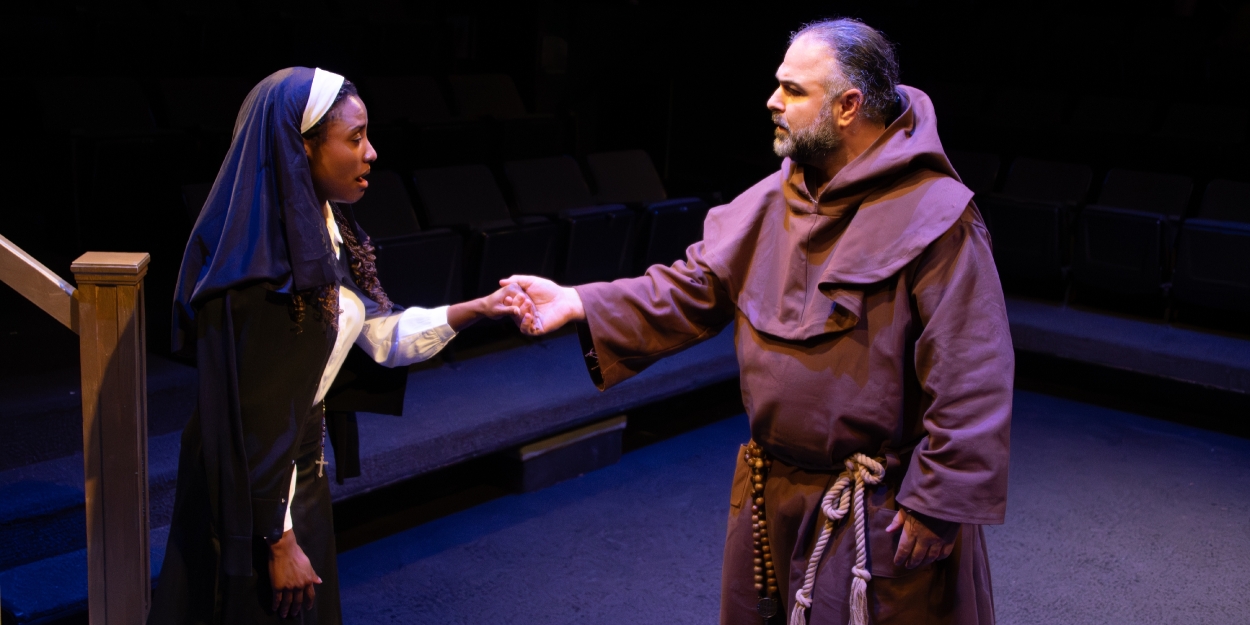
Those who knock Shakespeare like to say that his plays aren’t relevant to our lives or our society – what I think they really mean is that the language he uses is challenging for us, and thus doesn’t seem relevant, but let’s give them the benefit of the doubt. Rather than point them to Anthony Jeselnik’s infinitely tasteless (so I’m not linking to it) but wildly funny response to this complaint (which they rarely appreciate), I now instead ask them about Measure for Measure.
The briefest summary of the play is that Angelo, a judge, has condemned Claudio to die for the crime of fornication. When Isabella, Claudio’s sister, who is about to becomes a nun, pleads for his life, Angelo attempts a quid pro quo: her chastity for her brother’s life. A powerful man demands sex from a desperate young woman in exchange for something she dearly values. When she threatens to go public about his behavior, he mocks her, announcing that no one will believe her word over his. Yeah, that doesn’t sound the least bit relevant, does it?
In addition, the play is also a discussion about mercy, the public administration of justice, vice (primarily prostitution and its results), the faithless judge (a long running theme in Anglo- and American-folk music), and politics. Moreover, it’s got some downright laugh-out-loud funny parts. With all of that, one might ask, why is it so rarely performed? I’m glad you asked. Well, it’s also got some problems, too. First, there’s the whole propositioning a nun thing, which tends to turn people off. Then there’s the use of what’s often called a “bed trick.” This is when a man (almost always a man) thinks he’s going to bed with a particular woman, but in reality, it’s a different woman (nowadays, we mostly call that “rape”). Further, the ending, for a number of reasons, leaves many cold. And finally, while the two plotlines (and main characters) do intersect physically, they never really do on an emotional or intellectual level: that is, the main plotline is so heavy that the lowbrow humor of the secondary story is jarring, often leaving the audience with feelings of whiplash.
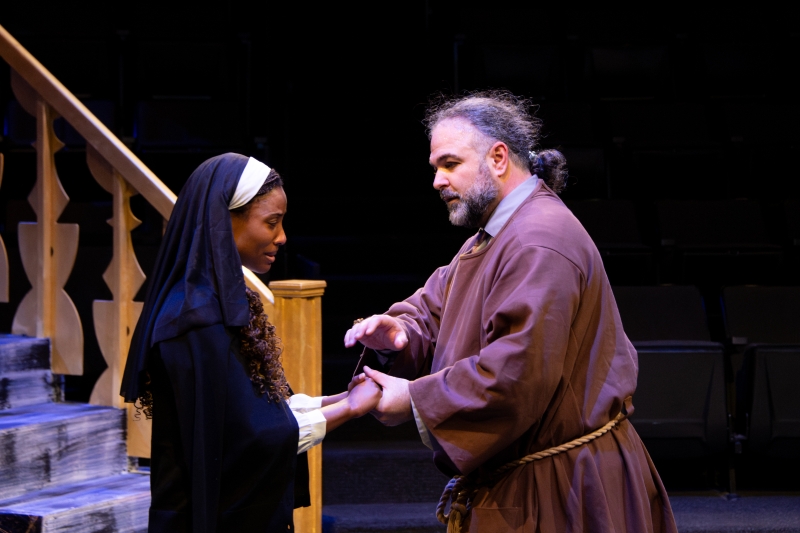
Both the positive and negative attributes of this play are clearly on display in Shakespeare Dallas’s winter production. I think the good firmly outweighs the bad, especially when you take into account the fact that unlike most Shakespeare Dallas productions, this one’s indoors! Although since they’re using Theatre 3’s Norma Young Arena Stage, it’s indoors, but it’s also in the round (or the rectangle, to be more precise), which has drawbacks of its own – but is a tradeoff I’m willing to make. Full disclosure: I’m a member of the Shakespeare Dallas Book Club, and on mostly friendly terms with many of the of the people involved with this production.
The best that this show has going for it is the cast; the individual performances are downright phenomenal, and are more than worth the cost of the ticket and your time. To give a clearer take, let me step back a bit:
Vienna’s duke (Ethan Norris) has a problem: licentiousness, in the form of non-marital fornication, is running rampant in the duchy. This is entirely his fault, he admits, because for almost twenty years, he hasn’t been enforcing the law against it, which, if it leads to conception, is a capital crime. Now, it may seem absolutely silly to us to think that sex would be illegal, not mention that pregnancy out-of-wedlock would merit the death penalty, but the larger issue, what happens to a community when laws are left both unrepealed and unenforced is a subject of particular interest these days. The Duke knows that if he, after granting such license for so long were to the bring down the hammer, it would appear most cruel, so he appoints a deputy of seemingly impeccable standing, Angelo (Carson Wright), to take over, and heads out of town. (This, too, may seem odd, but there’s actual historical precedent: in chapter 4 of The Prince, Machiavelli tells of Cesare Borgia doing something similar. Moreover, as Harry Jaffa pointed out, Borgia was known in that region as Duke Valentino; the Duke here is named Vincentio – sure, that could be a coincidence, I guess.) But the Duke doesn’t really go anywhere. In fact, he’s just going to disguise himself a friar and participate in what’s really the pilot episode of Undercover Boss.
Sometime later, the well-known man about town, Lucio (Omar Padilla) and two unnamed gentlemen (Adrian Godinez and TA Taylor in two of their several roles) visit a brothel, where the Madam, Mistress Overdone (Nicole Berastique, who also has many roles to play) informs them of Claudio’s arrest. Once her customers depart, Overdone is told by her husband, the pimp, Pompey (Brandon Whitlock), that the brothels are to be torn down, but she shouldn’t worry, as their business is forever in demand.
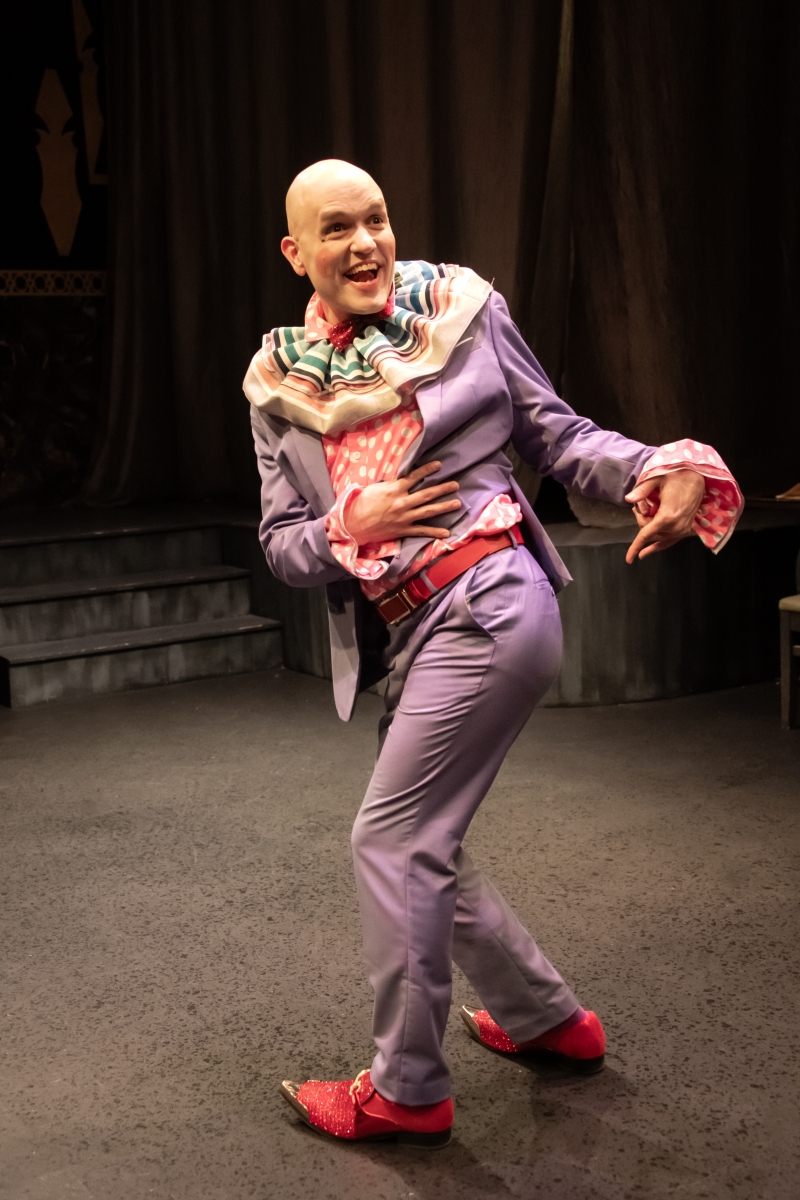
While Claudio (Doak Rapp) is being paraded around the city with a large F on his shirt (think the “Shame!” scene from Game of Thrones, but with clothes), Lucio is able to get the details from him. Yes, he’s guilty, he admits, but the lady in question is his fiancé, and he’d be happy to marry her, but Angelo isn’t giving that as an option. In desperation, he asks Lucio to bring his sister, who that very day was to join the strictest convent around, to plead his case to the deputy.
When Angelo is questioned by the Duke’s advisor, Escalus (Godinez again), whether he’s being too strict, and if maybe he too has had improper thoughts, Angelo explains that thoughts and actions are different, and moreover, when he does what Claudio has done, he too, should be punished the same way.
Isabella (Mikaela Baker), as one might suppose, isn’t fond of her brother’s sin, and is resigned, after Angelo rebuffs her to let him die (sighing, “I had a brother”), but Lucio prods her desperately, so she tries again. Recognizing that she’s on the wrong side of both the law and her religion, she resorts to special pleading, and finally suggests Angelo is being tyrannous. Angelo’s arguments are correct, but there’s something about Isabella that pulls him in a different direction – a horrible direction.
Was Angelo always a creep who just pretended to be a decent person? It doesn’t seem so, and yet, as it turns out, he previously had a fiancé, Mariana (Caitlin Chapa), whom he had done wrong (and who sings beautifully, to an original tune added to Shakespeare’s lyrics by Cherish L. Robinson), although he had never done anything like this. In fact, all agree, his blood is snow-broth.
This is some heavy stuff, broken up, as I said, somewhat jarringly by the clowns: there’s Constable Elbow (Taylor, again), a poor man’s version of Dogberry (he has the malaprop problem of the Much Ado star, but none of the pomposity or gravity); there’s the wonderfully named Abhorson (Godinez, a third time), the executioner, here resembling a cross between his colleague from Blazing Saddles and Miracle Max from The Princess Bride; there’s Master Froth (Rapp), a drunk; there’s Barnadine (Taylor, once more), a long-condemned prisoner who drinks through his days while refusing to be executed; and most importantly, there's the aforementioned Lucio (who straddles the two stories), Mistress Overdone, and (especially) Pompey.
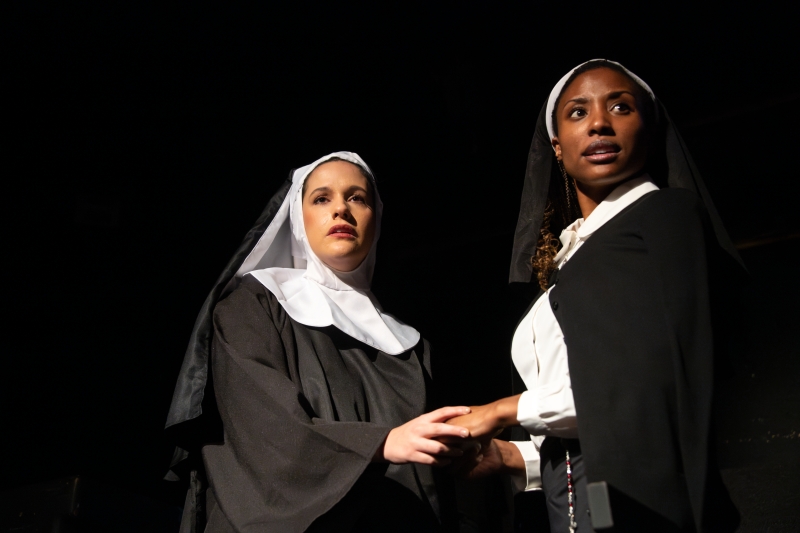
With a cast of ten playing at least two dozen roles (some are incidental: one is just a dead body), the quick costume changes are plentiful. Most impressive is Nicole Berastequi, whose four roles (Provost, Mistress Overdone, Mother Superior, and Juliet (the lady Claudio knocked up)) require what I believe were five costume and wig changes before intermission. And Korey Kent’s costumes work well, for the most part. There’s no real place and time theme in this production, so the costumes mostly reflect that. Angelo wears a double-breasted pinstripe suit, while Escalus boasts a green three piece that, I think, screams the 1970s. Mistress Overdone has a tight skirt that lends perfectly to a Peggy Bundy-esque walk. I don’t really understand Pompey’s costume, which except for the ruby shoes (tie-in to a current movie?) doesn’t in any way suggest pimp. There’s a definite look we’ve associated with the profession over the last forty or fifty years, so I’m not sure why Pompey’s outfit wouldn’t reflect that. Instead, he’d dressed like a clown (with red circles of makeup on his cheeks, no less), which seems out of place.
However, the biggest problem I have with this production (besides some issues with the script, of course) centers around the Duke’s “in disguise” costume. Not the costume itself, actually, but how it’s used. Norris, in his guise as the friar, rarely wears his hood, meaning everyone can clearly see his face. I know there is a belief among some Shakespeare practitioners that disguises in the plays are meant to be laughable, less believable than Clark Kent’s glasses (and come on, what kind of prize-winning investigative reporter is Lois Lane if a pair of glasses are all that’s needed to throw her off? Oh right, there’s also that one lock of hair curling down his forehead. That makes all the difference). But at least Clark wears his glasses. Here, the Duke/Friar does everything he can to make sure that his face is visible to everyone (except Lucio and Escalus, that is). It’s been suggested that rather than some inside joke, the idea here is that everyone can see through the Duke’s disguise, but they all pretend not to for their own reasons. I would grant more weight to this theory if those characters didn’t portray such profound (and honest seeming) surprise when the great reveal occurs.
The set is basically what Theatre Three had used for The Great Comet last month (including the chandeliers and the mirrors around the upper level), designed by Jeffrey Schmidt, with some redecoration by Korey Kent to create the three main locations: the court room, the jail, and the brothel. Sound designer Kellen Voss helps cut down on the unnecessary applause that too often accompany scene changes by playing through them, but his choice of music, especially early on, was disconcerting, not really fitting the mood. As the play goes on, and the tension mounts, the music seemed more appropriate. And each time we moved to the jail, he provided exactly what we expect a dungeon to sound like.
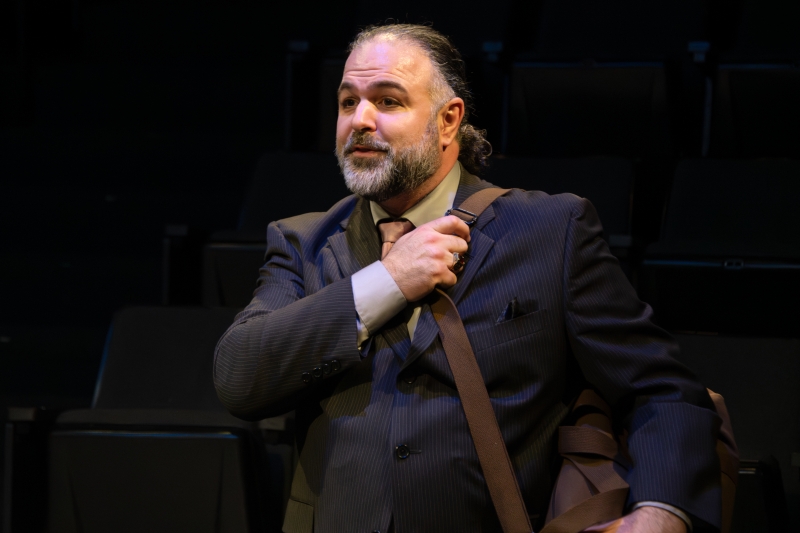
I thought the lighting (Aaron Johansen) worked very well for the quick scene changes and the differing moods of the action, and was most effective for the silhouetted scenes, while Zareen Afzaal’s props were spot on, especially for Pompey’s work in the off-stage abattoir.
We know that Shakespeare had a tendency to rework ideas or themes that had appeared in other plays (it’s really hard not to read much of Cymbeline as a “do-over” for Othello). Moreover, sometimes he makes allusions to his own work, while other times he fleshes out more fully what was just an embryotic thought from a different play. Of course, since we don’t really know the order in which they were written, it’s hard to say which is which. Here, though, the examples are numerous. As such, I think M4M could, in many ways, be looked at as an excellent companion piece to several of Shakespeare’s other plays. Not just because Angelo at one point mirrors Claudius’s comments about thoughtless prayer or because Claudio’s vision of death echoes the darkest parts of “to be or not to be”; nor the theme of people seeming to be exactly what they’re not; not just the convoluted plans devised by friars that seem to always include someone appearing to be dead; nor the good news kept from characters so that they’ll act a particular way; but especially because of the concept of mercy in the play. The Merchant of Venice talks a great game about mercy, but exhibits none of it. Here, everything turns on the application of mercy. It shouldn’t really be surprising that Isabella, who seeks to become a nun, is the key to that mercy, but it’s still very moving when she does what very few of us would ever be able to do.
One of the problems some people have with the play is that mercy is shown to people they don’t feel deserve it. Mercy and forgiveness are two separate concepts, but I believe they’re closely linked, so I feel comfortable quoting the always thoughtful Rupert Giles, who explained, “To forgive is an act of compassion, Buffy. It's not done because people deserve it, it's done because they need it.” I believe mercy works the same way; and, much like freedom of speech, which we always favor for the ideas we support (while it’s actually the ideas we loathe that require that freedom) it’s easy to grant mercy (or forgiveness) to the people we like; the question is, do we grant it to those we don’t?
Jenni Stewart has done us a great service in presenting and directing this little-produced play. Despite my criticisms, I greatly enjoyed this production (I’ve seen it three times, and have tickets for one more performance). I’m simply amazed that she actually staged the bed trick, which, to my understanding, almost always take place off-stage, and is just talked about, but never seen. I think her vision of the play works (as well as this play, with its structural issues, can work), and the cast she has assembled is excellent. And while there were some cuts I disagreed with, she did remove the extraneous, attention-diverting, completely unnecessary, but oh so deliciously curious hints of the missing subplot of the Roman gentlemen. When meeting with the actual Friar, the Duke announces he has another subject to discuss. Then, when he plans his great reveal, he instructs for several friends (all except one bearing traditional Roman names), heretofore unmentioned, to make themselves ready for something significant. There’s lots of speculation as to what this is all about, which, sadly, without a time machine, we’ll never know (and let’s be honest, even if we had a time machine, figuring out this mystery should be pretty low on anybody’s list of things to do with a time machine). As such, Stewart clearly made the right call in removing those references.
But most of all, I can’t state enough how strong this cast is, from top to bottom. Over the summer, Baker had shown her comedic skills, especially her timing, as Olivia in Twelfth Night, but her performance here shows she’s capable of far more than in any other role I’ve seen her in. She is truly stunning as Isabella. Wright, who has kept himself busy jumping from theater to theater lately, proved as both Poor Tom/Edgar (in the fall of '23's Lear) and Thomas Novachek (in this fall’s Venus in Fur) that he has the chops for the most challenging roles, and here he does not disappoint. His Angelo is, in turn, smarmy, unctuous, rigidly just, despicable, loathsome, self-loathing, and pathetic. The intensity of the scenes between them is palpable. Whitlock, coming off successful runs as Hamlet and Cassius, completely flips the switch in becoming Pompey. All the seriousness and angst of those previous roles is transformed into a wry and clever wit that does so much to keep the play moving.

Even though this play doesn’t rank up there with Shakespeare’s best, I highly recommend this production. Yes, at times the first half drags a bit, but the second actually flies by. And even during the slow parts, you’ll be able to sit in delight as these great actors ply their trade. The questions this play raises are the sorts that need to be discussed; they matter to our society, as much as to this Vienna, oddly populated by characters who all have Italian names, but who very much could be our neighbors. And lest I forget, this play also has arguably the least Shakespearean line in all of Shakespeare, when Isabella assures Lucio, “I’ll see what I can do.”
Because I’m the slowest writer this side of the Mississippi, the show has already run for two weeks, so time is running out for you to see Measure for Measure. There are three more evening performances (Thursday – Saturday) at 8 PM, and two matinees (Saturday and Sunday) at 2:30 PM. All performances are at Theatre Three (2688 Laclede St, Dallas, TX 75201). Tickets can be purchased at https://shakespearedallas.ticketspice.com/shakespeare-dallas-measure-for-measure-2025 (and there are also discounted rush tickets available at the door).
Photos courtesy of Linda Blase.
Reader Reviews

Videos

